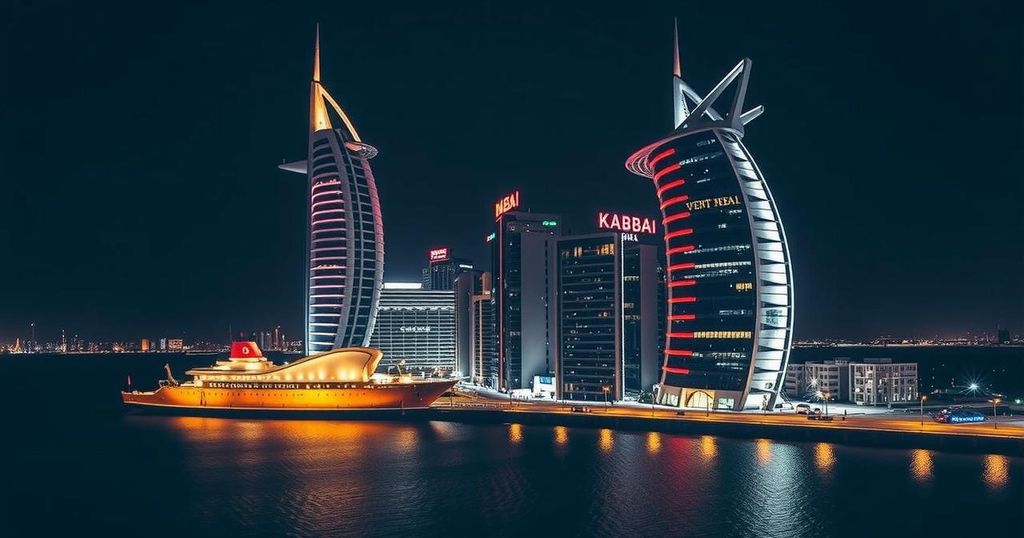Kazakhstan’s Elite Property Holdings in Dubai: A Scrutiny of Legitimacy and Accountability

Kazakh officials and their relatives own a significant number of properties in Dubai, with questions emerging around the legality and declarations of these holdings. The investigation by RFE/RL’s Kazakh Service, based on data from C4ADS, highlights inconsistencies in asset declarations, particularly in the wake of a push for asset recovery led by President Toqaev’s administration. While efforts to scrutinize foreign assets are announced, considerable challenges remain regarding transparency and accountability among Kazakhstan’s political elite.
Kazakhstan has a significant presence in Dubai’s real estate market, with a considerable number of former and current Kazakh officials, along with their relatives, reportedly owning substantial properties there. This has sparked inquiries regarding the legitimacy of these acquisitions and whether such holdings have been properly declared to Kazakh authorities. RFE/RL’s Kazakh Service has been investigating claims surrounding property ownership by Kazakh elites in Dubai, highlighted in data compiled by the Center for Advanced Defense Studies (C4ADS) since 2020. Some officials have attributed their Dubai investments to their pre-government careers or spouses’ business successes, while justifiable explanations for property ownership abound. Factors such as the political instability in Kazakhstan and the more favorable climate of Dubai make it an attractive option for public figures seeking to safeguard their wealth. The situation raises critical questions about the repatriation of potentially illicit assets, especially in light of a recent push by the Kazakh government—under President Qasym-Zhomart Toqaev—aimed at combating capital flight that surged after the political unrest in January 2022. Newly established commissions have begun the process of asset recovery, and a law to facilitate these efforts took effect, targeting major wealth holders, defined as those with net worths exceeding $100 million. Despite this legal framework, extensive scrutiny has yet to be levied on the Nazarbaev family’s foreign wealth, raising concerns about the effectiveness of asset declarations and accountability within the Kazakh government. Recent findings indicate that numerous properties in Dubai, reportedly owned by relatives of prominent officials, may have escaped scrutiny under this asset return initiative. Although some officials have declared possessions in the UAE, many others have not, perpetuating a culture of secrecy surrounding asset ownership. Moreover, it is noteworthy that while asset declarations are now mandatory, they remain inaccessible to the general public, raising further questions about transparency and accountability. An array of names linked to substantial property ownership has been cataloged, suggesting the potential for widespread concealment of wealth, and leading to increased public suspicion and demands for reform. Investigative collaborations, such as those between independent media outlets like Vlast.kz and RFE/RL, have attempted to shed light on these issues by exposing irregularities in the declarations made by high-profile individuals. As authorities claim to be actively investigating illegal asset holdings in the UAE, many questions linger regarding the impartiality and thoroughness of these efforts. The statement by Deputy Prosecutor-General Ghalymzhan Qoigeldiev underscores the complex relationship between officials and their obligations to report holdings: “Those people who left the country are trying to steal their millions. They will be constantly wanted.” The ongoing situation remains tenuous as former officials continue to grapple with the scrutiny of their foreign assets in light of evolving governmental policies and regulations.
The revelations surrounding Kazakh officials’ property ownership in Dubai come against a backdrop of considerable political and economic turmoil within Kazakhstan. Following a series of protests in January 2022, a new government initiative emerged, aimed at addressing capital flight and asset recovery for individuals linked to alleged crimes or corruption. The landscape of asset ownership is further complicated by the favorable investment climate in Dubai, making it a haven for high-net-worth individuals seeking to safeguard their wealth amid domestic instability.
The investigation into the property holdings of Kazakh officials in Dubai presents a critical lens through which to examine issues of accountability, transparency, and corruption in Kazakhstan. As laws for asset declaration tighten, the need for stringent enforcement and independent scrutiny becomes increasingly vital. The contrasting approaches to wealth repatriation and legal accountability underscore systemic weaknesses within the Kazakh government and highlight the ongoing challenge of addressing capital flight and illicit asset holdings among the political elite. With ongoing investigations and public governance reforms, vigilance will be essential to ensure that the interests of the Kazakh populace are adequately represented and that those in positions of power are held accountable for their financial dealings both domestically and abroad.
Original Source: www.rferl.org








